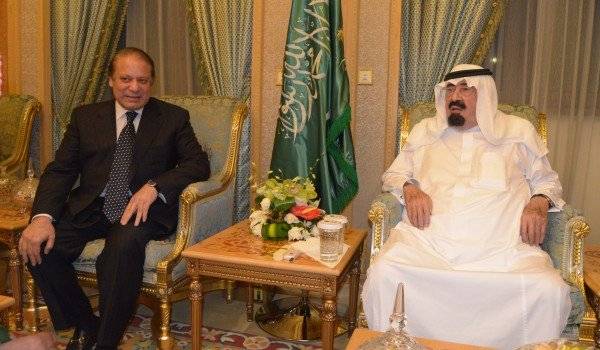Pakistan, being an integral part of so-called Greater Middle East, can by no means afford to stay aloof. Pakistan’s certain geo-strategic, security and economic compulsions warrant its proactive but positive involvement in the region. Therefore, it has always been a great diplomatic challenge for Pakistan to stay neutral in the mutual conflicts and regional rivalries of Middle Eastern countries. Necessarily in line with its state policy, Pakistan constantly maintained its neutrality during the 8-year long Iran-Iraq war in 1980’s. Similarly, Pakistan also refused to become a part of Saudi-led coalition to intervene in Yemen last year.
At present, Pakistan is facing a more complex situation as the tension between Saudi Arabia and Iran has observably escalated since the execution of prominent Shia cleric Sheikh Nimr al-Nimr in Saudi Arabia. Pakistan’s confusion over joining the recently-proposed Saudi-led 34-state military alliance was quite visible. As it reluctantly confirmed its participation in the said alliance, Pakistan made it clear that it would not send its ground troops to the Kingdom. The two young Saudi princes have also visited Pakistan to persuade it to actively participate in the military alliance under their very command.
Containing the two holiest sites in Islam, Saudi Arabia is loved and respected by all the Muslims in the world. Saudi Arabia has strong economic ties with Pakistan. It has generously helped Pakistan on a number of occasions. Presently around 2 million overseas Pakistanis are working in the Kingdom. On the other hand, Iran is a great Muslim country in Pakistan’s neighbourhood. Pakistan also has a lot of economic, security and strategic interests in Iran. This resource-rich country can help Pakistan overcome its current energy crisis. The Iran-Pakistan (IP) gas pipeline project is also in progress. Pakistan can now build strong economic ties with Iran as the international economic sanctions on Iran have been lifted by the implantation of Joint Comprehensive Plan of Action (JCPOA), agreed by Iran and P5+1 countries. Taking advantage of Pakistan’s strained relations with Iran, India has already consolidated its position in Afghanistan to the disadvantage of Pakistan by fostering close relations with Iran. At this stage, Pak-Iran disharmonious relations would adversely affect Pakistan’s ongoing domestic counter-terror efforts. Similarly, this situation will also jeopardise the future mega economic projects in Pakistan, namely the CPEC.
If Pakistan takes sides in the current Saudi-Iran conflict, then this move will most likely give rise to a violent sectarian strife in the already troubled and sectarian-hit country. Therefore, Pakistan’s paramount national interests demand the maintenance of close and cordial relations with both Middle Eastern giants.
However, a bit late, but Pakistan has rightly decided to play a mediatory role in the current Middle East crisis. Prime Minister Nawaz Sharif and COAS General Raheel Sharif have visited the Saudi Arabia and Iran urging both countries to de-escalate and resolve their mutual differences peacefully. Pakistan’s diplomatic maneuvering would somehow help ease the tension between two antagonist states. Pakistan, being the only nuclear and largest military power in the Muslim world, can definitely play a positive role in resolving the mutual conflicts of Muslim countries in the world.
At the moment, it cannot be precisely predicted what will be the outcome of Pakistan’s current diplomatic efforts to make peace in the Middle East. Nevertheless, Pakistan’s peace initiative certainly has great symbolic value. It necessarily reflects Pakistan’s genuine and sincere intention to bring peace in the region. It will also help dilute the impression that Pakistan is taking sides in the current Middle East conflict. Ever since Pakistan has formally announced to join the Saudi-led military alliance, it is being speculated that Pakistan is going to abandon its previous policy of neutrality.
Pakistan has made it quite clear that it will not allow any country to exploit its military strength to the disadvantage of another country in the Middle East. No Arab state should expect any moral or military support from Pakistan while articulating and advancing its narrow selfish interests in the region.
In the absence of any effective conflict resolution forum, the mutual conflicts between the states are tending to be full-fledged confrontation in the Middle East. In the past, the OIC, “the collective voice of the Muslim world”, has been an effective forum to debate and discuss the issues confronted by the Muslim countries. Regrettably, owing to multiple reasons, this forum has become quite inactive and ineffective. Therefore, Pakistan’s current diplomatic efforts directed towards seeking the peaceful solution of Middle East crisis should also be appreciated and supported by the other Muslims countries. Presently, the so-called D8 countries possess the considerable economic and military muscles in the Muslim world. Besides Pakistan, these countries should also play their respective role in easing the conflict between two Muslim states. China has also announced similar peace initiatives to help resolve the current crisis in the Middle East. Therefore, Pakistan should launch a concerted diplomatic campaign in a systematic and synchronised manner in collaboration with China and other D8 countries to ease tension in world’s most volatile and troubled part.
At present, in the face of current Middle East crisis, the ‘erstwhile’ so-called Middle East peace process is just in the middle of nowhere. The hapless Palestinians are feeling more insure. Now nobody is championing their rights against Israel. Nobody is talking about their miseries and sufferings. Both Middle Eastern arch rivals must now realise that their mutual confrontation will get them nowhere. Instead, it will badly damage the collective state and societal fabric of entire Muslim Ummah beyond repair. They should put an end to the ongoing zero-sum game by halting their proxy war in the region.






